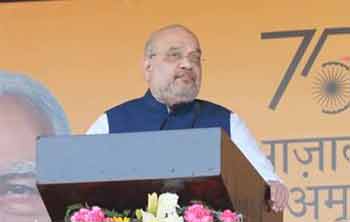Summary : Union Home Minister Amit Shah has announced three new criminal laws under Bharatiya Nyaya Sanhita, marking the most significant reform in the 21st-century criminal justice system. The launch includes innovative tools like e-Evidence, Nyay Setu, Nyay Shruti, and e-Summons App.
Introduction
INVC NEWS
Chandigarh : In a landmark move, Union Home Minister Amit Shah unveiled a series of revolutionary reforms in India’s criminal justice system. The announcement of three new criminal laws under the Bharatiya Nyaya Sanhita promises to reshape the landscape of legal proceedings in the country. With the introduction of digital tools like e-Evidence, Nyay Setu, Nyay Shruti, and the e-Summons App, the reforms are poised to streamline and modernize the administration of justice. This historic event, graced by Punjab Governor and Chandigarh Administrator Gulabchand Kataria and the Union Home Secretary, is set to be a game-changer in the 21st century.
The Dawn of a New Era in Criminal Justice
Breaking Down the Three New Criminal Laws
Amit Shah’s declaration heralds a new era of transparency and efficiency in the criminal justice system. But what exactly do these new laws entail? Here’s a breakdown:
- Criminal Procedure Code (CPC) Amendment:
- Speedy Trials: Ensuring justice is served without undue delay.
- Victim Rights: Strengthening protections and support for victims.
- Digital Integration: Emphasizing the use of technology in judicial processes.
- Indian Penal Code (IPC) Overhaul:
- Modernized Offences: Updating definitions and penalties for contemporary crimes.
- Proportional Sentencing: Ensuring punishments fit the crimes committed.
- Restorative Justice: Promoting reconciliation between offenders and victims.
- Evidence Act Reforms:
- Digital Evidence Acceptance: Simplifying the use of electronic records in court.
- Chain of Custody: Ensuring the integrity of evidence from collection to presentation.
- Witness Protection: Safeguarding individuals who testify in criminal cases.
E-Evidence: Transforming the Evidentiary Landscape
The introduction of e-Evidence is a game-changer for the Indian judicial system. This innovative tool enables the seamless collection, storage, and presentation of digital evidence in court. It ensures that evidence is tamper-proof and readily accessible, which is crucial for maintaining the integrity of legal proceedings.
- Digital Records: Enables courts to handle digital records efficiently.
- Security Features: Prevents tampering and ensures authenticity.
- Accessibility: Makes evidence available at the click of a button.
Nyay Setu: Bridging the Gap
Nyay Setu aims to bridge the gap between the judiciary and the public. This platform allows for easier access to legal resources, court records, and case updates. It’s a step towards demystifying the judicial process for the common man.
- User-Friendly Interface: Designed for ease of use by non-legal professionals.
- Real-Time Updates: Keeps users informed about their case status.
- Legal Resources: Provides access to legal documents and precedents.
Nyay Shruti: Streamlining Legal Documentation
Nyay Shruti simplifies the management of legal documentation. This tool helps in drafting, storing, and retrieving legal documents, making the process more efficient and less time-consuming.
- Document Management: Simplifies the creation and storage of legal documents.
- Efficiency: Reduces the time spent on paperwork.
- Organization: Keeps documents systematically arranged and easy to find.
E-Summons App: Revolutionizing Summons Delivery
The e-Summons App modernizes the process of issuing and receiving court summons. This app ensures timely delivery and acknowledgment, reducing delays caused by traditional methods.
- Digital Summons: Issues summons electronically, cutting down on paper use.
- Tracking: Allows for real-time tracking of summons delivery.
- Acknowledgment: Ensures recipients acknowledge receipt promptly.
The Impact on the Criminal Justice System
Speedier Justice
One of the main goals of these reforms is to expedite the judicial process. By leveraging technology and modernizing outdated procedures, the time taken to resolve cases can be significantly reduced. This not only benefits the victims but also ensures that justice is not delayed.
Enhanced Transparency
Transparency is a cornerstone of justice. The new laws and tools are designed to make the judicial process more open and accessible. With features like real-time updates and digital records, the public can have greater confidence in the system.
Greater Accountability
With the integration of digital tools, there is a built-in mechanism for accountability. Every step of the judicial process can be tracked and recorded, reducing the chances of corruption and malpractice.
Improved Victim Support
The new laws place a stronger emphasis on the rights and support of victims. By ensuring their protection and simplifying their interaction with the legal system, the reforms aim to make the process less daunting for those seeking justice.
Frequently Asked Questions (FAQs)
What are the three new criminal laws introduced by Amit Shah?
The three new criminal laws include amendments to the Criminal Procedure Code (CPC), an overhaul of the Indian Penal Code (IPC), and reforms to the Evidence Act. These changes aim to modernize and streamline the criminal justice system in India.
How will e-Evidence transform legal proceedings?
E-Evidence will revolutionize the handling of digital records in court by making them more accessible and secure. It ensures the integrity of evidence and speeds up the judicial process by allowing digital submissions.
What is the purpose of Nyay Setu?
Nyay Setu is designed to bridge the gap between the judiciary and the public. It provides easier access to legal resources, court records, and real-time case updates, making the judicial process more transparent and user-friendly.
How does the e-Summons App improve the summons process?
The e-Summons App digitizes the issuance and acknowledgment of court summons, ensuring timely delivery and reducing delays. It also allows for real-time tracking and confirmation of receipt.
What impact will these reforms have on the criminal justice system?
These reforms are expected to expedite the judicial process, enhance transparency, improve accountability, and provide better support for victims. By integrating modern technology, the reforms aim to create a more efficient and reliable criminal justice system.
Conclusion
Union Home Minister Amit Shah’s announcement of the Bharatiya Nyaya Sanhita and the accompanying digital tools marks a significant milestone in the evolution of India’s criminal justice system. The three new criminal laws and the introduction of e-Evidence, Nyay Setu, Nyay Shruti, and the e-Summons App are poised to bring about the most significant reform of the 21st century. These changes promise to make the judicial process more efficient, transparent, and accessible, ensuring that justice is served swiftly and fairly. As India embraces these reforms, it steps into a new era of legal innovation and integrity.














